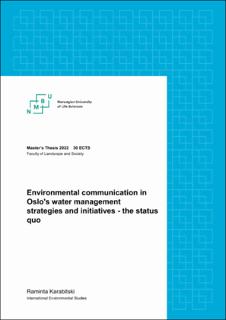| dc.description.abstract | This Master's thesis investigates environmental communication of initiatives and strategies related to climate change in water-related themes in Oslo. Environmental communication is premised on the assumption that more effective environmental messages communicated by communication experts can positively influence citizens by rethinking and reorienting global, national, and municipal environmental efforts to develop a more persuasive political practice that can rapidly accelerate the pace and scope of social change in adopting climate-friendly lifestyles. Therefore, I analyzed sound online climate strategies and initiatives to curb water-related climate threats in Oslo undertaken by scientists, municipality, and governmental actors. Essentially, I studied how stakeholders used communication strategically and compared analyzed approaches to the theoretical efficiency of such communication.
This study builds its theoretical argumentation based on empirical evidence collected through semi-structured interviews and surveys with environmental communicators and analyzed water related climate strategies in Oslo.
Consequently, a content analysis of Oslo's strategies and initiatives revealed that climate adaptation, long-term climate strategy, and vulnerability analysis were central strategies for Oslo. Moreover, climate initiatives published on social media presented various attractive visual techniques to convey valuable messages.
According to the survey results, study participants had a solid understanding of the anthropological origins of climate change and the severe threats this crisis poses to various groups but had limited knowledge of water-related climate consequences to Oslo.
Later, the interviews with environmental communicators were arranged to enclose their implications for environmental communication. This study determined effective communication approaches such as diversification of target audience and location-based messages, utilization of language that is understandable for society, premises of using social media and engaging with the audience in social networks comments. From here, I argue that climate communication is a crucial dissemination pathway capable of meeting the information demands required for civil society to act. Nevertheless, some barriers were identified, such as disagreements on most effective climate messages, a lack of understanding of the target audience’s needs, and struggles with financial resources.
Eventually, the comparative analysis was carried out. A comparison of theoretical best practices in environmental communication with empirical findings from analyzed water-related strategies, interviews, and surveys with communication experts,revealed four major obstacles. Firstly, environmental communication was oversimplified. Secondly, there was an evident disconnection between environmental communicators and the target audience. Additionally, traditional communication methods predominated despite the climate crisis requiring more innovative approaches, especially regarding language and visual content. Finally, the link to proactive behavioral changes in the form of more direct communication with citizens was missing.
The thesis concludes with the outlines of an environmental communication process that enhances civic engagement and democratic decision-making. Finally, research desiderata are identified at the end of this thesis, and directions for further studies are shown. | en_US |

